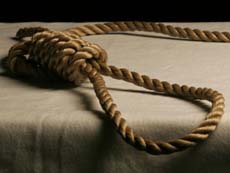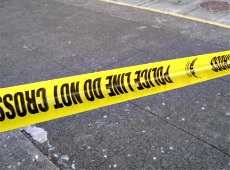Three men have been arrested for their alleged involvement in last Friday’s stabbing incident – the first in a succession of violent crimes in Male’ over several days – prompting police to form a special task force for combating gang violence.
Police arrested Mohamed Kinaanath Ahmed, 28 years-old, of Lobby house in Male’s Henveiru neighborhood, Ahmed Shirhan Shameem, 21 years-old, from Kolhufushi Island in Meemu Atoll, and Assad Ibrahim Rasheed, 18, of Male’ Dhaftharu 7644, on “suspicion of stabbing Mohamed Shaifan” on Friday (May 17).
Kinaanath was previously released from jail under the ‘second chance’ program and is the older brother of Hussain Humaam. Humaam is currently being tried in the Criminal Court for his alleged connection to the murder of Ungoofaaru Constituency MP Dr Afrasheem Ali.
Shaifan was the first victim in a series of four stabbing incidents that occurred in Male’ over a 48 hour period, resulting in a total of five people injured as police continue to search for suspects.
The three suspects to have been arrested, as well as the five stabbing victims, all have police records “tying them” to theft, assault, and narcotics cases, a police spokesperson told Minivan News today (May 21).
Police have identified several additional suspects linked to the series of stabbings and are currently searching for the individuals, the official added.
“Gangs will be stopped”
Meanwhile, Police Commissioner Abdulla Riyaz told local media that gang reprisals are believed to be behind the recent series of stabbing attacks.
“Gangs will be stopped. We will do whatever it takes to bring the gangs to justice. The police will not back down in their efforts,” said Commissioner Riyaz.
The Police Services announced Monday (May 20) that a special task force has been created, under the Specialist Crime Command, to combat gang activity in the Maldives.
“The task force will address various activities, criminal or otherwise, carried out by groups of individuals who identify themselves as gangs. Additionally, it aims to take every action possible to curb gang activity to an extent that ensures safety and peace in the community.”
To fulfill its mandate, the special task force will monitor gang activity, investigate any unlawful actions carried out therein, attempt to hasten prosecution on such matters.
The now-active task force consists of members from the Forensics Directorate, Intelligence and Covert Policing Command, Information and Communication Directorate, Central Operations Command and Technical Police from the Divisional Operations Command of the Maldives Police Service.
“We have made great strides into the investigation of the recent violence. But we need a lot of assistance from the public to catch these perpetrators. So it is our sincere request for people to come forward with photographs or videos of the crimes,” Commissioner Riyaz added.
Dynamic local gangs
“The recent series of stabbings are quite worrying because there has been an absence of violent crime like this for some time,” former head of police intelligence Chief Superintendent Mohamed ‘MC’ Hameed told Minivan News today.
 “Now that we’ve seen five stabbing victims of violent crime, we might see one or two more incidents,” said Hameed.
“Now that we’ve seen five stabbing victims of violent crime, we might see one or two more incidents,” said Hameed.
“There are many locally known crime gangs of varying size and capacity. The way local crime gangs operate is quite dynamic,” he continued. “They individually carry out crimes in accordance with ‘others’ orders, instructions, and payments.”
“Gang rivalries have existed for a long time, it’s an everyday thing. The fact that these recent stabbings occurred during the daytime is not new [practice],” he added.
Hameed explained that previously, the police would know that a particular stabbing was carried out by a certain group, even if evidence was lacking, and the persons involved would be identified between 24 to 72 hours after an incident occurred.
Regarding the recent stabbings, Hameed said the incidents are probably retaliatory and inter-related based on what local media has reported. He also alleged that the three men that have been arrested are part of a gang based in Male’.
“I don’t understand the link between these three and Shaifan, but it’s quite possible,” he said.
“No effective policing approach”
“It’s also very worrying thing that policing, in Male’ especially, is not sustained well. There is not a clear approach to reduce and deal with violent crimes and criminals,” stated Hameed.
“Not being able to police Male’ – the most populated city in the country – due to the lack of an effective strategy and the disconnect between the key areas of criminal investigations, intelligence gathering, and front line policing is a big issue,” he added.
In addition to the lack of a “very effective policing approach” to combat violent crime, low level crimes have not been addressed, according to Hameed.
crimes have not been addressed, according to Hameed.
“A lot of antisocial behavior goes unnoticed and unaddressed by the police, such as harassment and public nuisance. For example, girls of a very young age are harassed, even while walking with their families. Additionally, juveniles are seen under the influence of drugs and intoxicated in public,” he explained.
Hameed advocated that a strong, more integrated, holistic approach is needed that applies a broader strategy to effectively reduce crime.
“Increasing police officers physical presence, as well as effective targeting of high profile offenders and hotspots needs to be addressed,” Hameed said.
“Collaboration between criminal investigations, intelligence gathering, and front line policing are three areas that have never worked that effectively,” he added.
These departments lack a common understanding of one another as well as streamlined “organisational engineering”, and are reluctant to collaborate, according to Hameed.
“To be more effective, key personnel from these departments must come together regularly, at the start of duty shifts, once daily, and weekly, to target, prioritise, and discuss arrangements to ensure a safe environment [for the public],” he suggested.
During former Police Commissioner Ahmed Faseeh’s time a gang task force was established, while former Police Deputy Commissioner Mohamed Rishwan developed a severe and organised crime strategy to proactively combat these issues, Hameed explained.
“We had a dedicated team, work space, facilities, and arrangements focused on gang criminals to reduce and prevent such violent crimes,” said Hameed.
“It was a more proactive approach, and we saw some success, but was not sustained [by the current government],” he continued.
“There are approximately 16 locations we identified as high risk hotspots [for gang activity] but those areas might have increased in the last year. If police regularly attend these locations, we might not see violent crimes,” he added.
While Hameed believes targeting high profile criminals is an effective strategy, he “can understand the police cannot always focus on these offenders given the current government situation involving protesters and the police getting called for ‘public order policing’,” he said.
“With the uncertainty surrounding the upcoming elections, police need to stick to their basic mission of keeping the peace. They need a very clear mandate, because it is also their duty to make sure violent crimes don’t affect the election environment making it unsafe to be out on the streets,” Hameed emphasised.
“After this government’s formation in 2012, the President’s Office came up with a crime prevention committee, which included all law enforcement [agencies] and [relevant] ministries, however we have yet to see results,” claims Hameed.
Four attacks and five victims in 48 hours
Shaifan was stabbed near Star Cinema in Male’s Maafanu neighbourhood, which was reported to police around 6:30pm Friday (May 17).
Police have confirmed that the attackers arrived on motorcycles and attacked Shaifan “in the company of others”. The 20 year-old victim suffered “deep injuries” about three inches wide and two inches deep in two locations on his back, near his lungs and backbone, according to police. Shifan underwent surgery and is still receiving medical treatment at an unspecified hospital, according to police.
 The Criminal Court recently acquitted Shaifan, and five other suspects, for the stabbing murder of Ali Shifan that occurred on April 1, 2012, outside the Westpark restaurant on Boduthakurufaanu Magu, the outer ring road of Male’. The court acknowledged that Ali Shifan’s DNA was found under Shaifan’s fingernail, and accepted that this was “strong forensic evidence”, however ruled that there was not enough evidence to convict.
The Criminal Court recently acquitted Shaifan, and five other suspects, for the stabbing murder of Ali Shifan that occurred on April 1, 2012, outside the Westpark restaurant on Boduthakurufaanu Magu, the outer ring road of Male’. The court acknowledged that Ali Shifan’s DNA was found under Shaifan’s fingernail, and accepted that this was “strong forensic evidence”, however ruled that there was not enough evidence to convict.
The second attack, which also took place Friday, occurred near Machangolhi Cemetery in Male’s Machangolhi neighbourhood and was reported to police around 7:00pm. The victim, Hussain Ziyad, 19 years-old, from Hithadhoo Island in Seenu Atoll, suffered two stab wounds to the shoulder and one in the back, but has since been released from the hospital.
Police have revealed that their investigation has indicated the attack was premeditated.
On Saturday (May 18), two young men, 18 year-old Naseeb Saeed from Feydhoo Island in Seenu Atoll and 21 year-old Mohamed Azhan Ismail from Male’s Maafanu neighborhood, were stabbed near Azmi-Naeem Medical & Diagnostic Centre (AMDC) in Maafanu at approximately 3:30pm, a police media official told Minivan News at the time.
A group of people on motorcycles attacked the pair with a “sharp object”, stabbing Saeed five times causing injuries to his abdomen, shoulder near his chest, and back, while Ismail suffered two “deep lacerations” to the back.
Both victims remain in serious condition at Indira Gandhi Memorial Hospital (IGMH), Deputy Head Chief Superintendent of Police Mohammed Riyaz of the Specialist Crime Command told local media Riyaz. No arrests have been made at this time, however police have identified two suspects during the course of their investigation.
The fourth stabbing incident occurred Sunday (May 19) in Male’s Maafanu neighborhood at approximately 6:20pm.
The victim, 19 year-old Usman Shareef from Male’s Maafanu neighborhood, fled into an electronics store, where he tried to shelter from his attackers. However, an eyewitness told local media that although the victim ran into the shop and hid behind the counter, the group followed him into the shop, stabbed him in two places, and then fled the scene.
The victim was taken to ADK Hospital via motorcycle by the store’s employees. He is currently being treated for neck and arm injuries.
Riyaz stated that police have found evidence linking some suspected individuals to the case and are investigating further.
Likes (0)Dislikes
(0)Dislikes (1)
(1)  Death penalty legislation was presented to parliament in June by government-aligned Dhivehi Qaumee Party (DQP) MP Riyaz Rasheed to implement the death penalty by hanging if the Supreme Court upheld a death sentence passed by a lower court. The legislation was put to a vote to decide whether or not to proceed with the bill at committee stage and was ultimately
Death penalty legislation was presented to parliament in June by government-aligned Dhivehi Qaumee Party (DQP) MP Riyaz Rasheed to implement the death penalty by hanging if the Supreme Court upheld a death sentence passed by a lower court. The legislation was put to a vote to decide whether or not to proceed with the bill at committee stage and was ultimately  “Now that we’ve seen five stabbing victims of violent crime, we might see one or two more incidents,” said Hameed.
“Now that we’ve seen five stabbing victims of violent crime, we might see one or two more incidents,” said Hameed.
 The Criminal Court recently
The Criminal Court recently